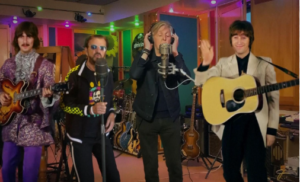
BREAKING NERWS : The Best Singer In Beatles McCartney Has Said The Is No Large Music In Beatles Due To ……..
In a recent interview, Paul McCartney, the legendary bassist and singer of The Beatles, made a shocking statement that has sent waves through the music world. McCartney claimed that the reason The Beatles never produced “large” or grandiose music—an idea he has now reflected on with clarity—was due to the creative differences that divided the band during its later years. The comments shed new light on the complex dynamics of one of the most influential musical groups in history.
The Beatles, renowned for their diverse and groundbreaking catalog, explored various genres and pushed musical boundaries. From the early rock and roll of “Please Please Me” to the experimental sounds of “Sgt. Pepper’s Lonely Hearts Club Band,” their sound evolved constantly. However, McCartney’s recent reflection suggests that while the band’s work was innovative, it was also constrained by internal conflicts and contrasting artistic visions.
According to McCartney, The Beatles’ music often lacked the “large” or more expansive qualities that other bands of the era, such as The Beach Boys or later Pink Floyd, achieved. He attributes this limitation to the differing approaches to music within the band, particularly between himself and the other members—John Lennon, George Harrison, and Ringo Starr.
For McCartney, the notion of creating “large” music involved embracing broader, more orchestral arrangements and greater sonic experimentation. He points to his own compositions, like “Yesterday” and “Eleanor Rigby,” which already hinted at a more expansive, classically influenced approach. However, McCartney admits that John Lennon, the band’s co-leader, was often more focused on raw, stripped-down rock and roll, which clashed with Paul’s more ambitious and intricate arrangements. This ideological divide, McCartney argues, limited the band’s ability to fully explore grander musical concepts, as Lennon’s directness and minimalist preferences often clashed with Paul’s desire for lush soundscapes.
Moreover, McCartney’s reflection touches on George Harrison’s growing frustration with the band’s narrow musical focus in the late 1960s. Harrison, who had a deep interest in Indian classical music and experimental sounds, struggled to inject more expansive, spiritual elements into the group’s work. While tracks like “Within You Without You” and “Norwegian Wood” showcased his creative direction, McCartney believes that Harrison’s musical explorations were often sidelined in favor of Lennon’s and his own ideas.
The tension over creative control ultimately contributed to the band’s breakup in 1970, as McCartney and Lennon’s rivalry over musical direction became more pronounced. McCartney’s statement reflects a long-held frustration that The Beatles, despite their unparalleled success, never fully realized their potential as a collective in terms of producing “large” or genre-defying music. The creative friction, he admits, was both a driving force for their innovation but also a limiting factor that prevented them from reaching their full musical potential.
Interestingly, McCartney’s comments may also hint at his own ongoing musical evolution. Since the breakup of The Beatles, he has consistently pushed the boundaries of his own work, exploring orchestral music with the “Liverpool Oratorio,” electronic elements in his solo albums, and even collaborations with avant-garde musicians. His recent statements suggest that McCartney, even decades after The Beatles’ dissolution, still yearns to create music on a grander, more expansive scale—free from the creative limitations of the past.
In the end, Paul McCartney’s revelation is a fascinating glimpse into the inner workings of The Beatles. The band’s music, while legendary and revolutionary, was also shaped by the tensions and personalities of its members. And for McCartney, the idea of “large” music remains an unfinished chapter in the band’s story.







